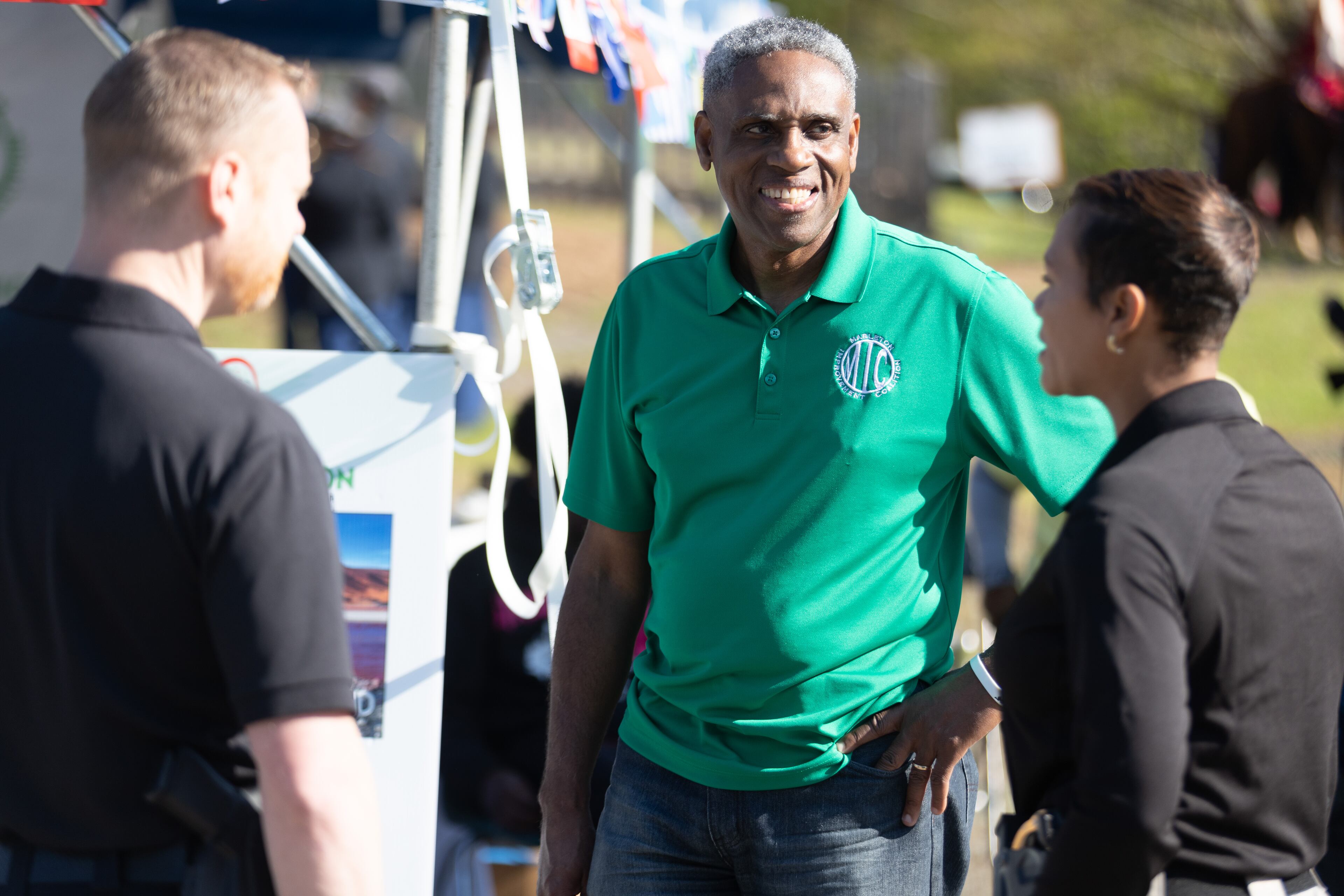Cityhood will reshape Mableton, a community looking for change

Picking up trash may not be how most people picture spending a Saturday morning. But in Mableton, Cobb County’s newest city, volunteers gather nearly every weekend to do just that along the area’s parks and roads.
What began as a quarterly cleanup on Floyd Road to address frustrations over littering has evolved into weekly gatherings throughout the city, where residents work together to improve their neighborhoods bit by bit.
Litter represents one small manifestation of the underinvestment and lack of engagement that plagued Mableton, and the area known as South Cobb, for decades. That, in turn, has led to Mableton’s less-than-desirable reputation, much to the dismay of those who take pride in calling Mableton home.
The community now finds itself at a crossroads after the creation of the new city.
Cityhood presents the unique opportunity to shape Mableton’s future. The trick, locals say, will be to revitalize the area without repeating the history of disenfranchising one community for the betterment of another.
“I’d rather live here than anywhere else,” said Barry Krebs, as he picked up litter along a roadway on a recent Saturday morning. “You get to meet people, you get to serve, and it makes you feel good to give back.”
Jeff Padgett, who was born and raised in Mableton, said he has seen the excitement and energy grow in the community in the last few years — and that culminated with the passage of the cityhood referendum.
“I love Mableton — I just love it,” Padgett said. “The people are changing. The culture is changing, and it’s changing for the better.”

In Atlanta’s suburbs, Cobb County was the last to come under Democratic control after decades of conservative leadership that fostered investment in some of the county’s wealthier, whiter communities.
In 2020, the County Commission became all-women, with a majority of Democratic women of color when Chairwoman Lisa Cupid became the first Black chair in the county’s history.
While recent demographic shifts changed the makeup and political leadership of the county, remnants of underinvestment linger in South Cobb. In many areas, there is a decided lack of access to fresh produce, adequate health care services and quality affordable housing, Mableton Mayor Michael Owens said.
“A lot of attention, a lot of effort and, quite frankly, a lot of money has gone to other areas within the county,” Owens said. “(Cityhood) allows citizens and the leadership within Mableton to determine what projects are prioritized, and, historically, we have not had that.”
Frustrated by the sense of neglect and looking for local control, residents voted in November 2022 to form their own city government to perform services mostly centered around redevelopment — planning and zoning, code enforcement, sanitation and parks. The newly elected mayor and city council will decide over the next several months which services to provide.
The first Mableton city council meeting is Thursday, May 11, at 6:30 p.m. at the Riverside Epicenter in Austell.
Each council member represents roughly 13,000 people, and residents hope localized decision-making will better address Mableton’s diverse needs.
The area has “suffered from these decades of disinvestment,” said Ray Thomas, president of the Mableton Improvement Coalition. “We do have different pockets of poverty. What a lot of people don’t know is that we also have pockets of prosperity.”

The area has several revitalization efforts stirring — the redevelopment of a shopping center is nearing completion, a new mixed-use residential neighborhood is underway, and new luxury apartments are coming soon.
All of that combined with comparatively affordable housing and natural assets, such the Chattahoochee River along the city’s eastern border and the Silver Comet Trail, has made the area increasingly desirable, Thomas said.
Gentrification fears
The Veterans Memorial Highway corridor runs through the middle of the city and is an oft-used example of a blighted area ripe for redevelopment.
Donté Philpot, a Mableton volunteer with the Austell Community Taskforce, said he wants to see the corridor redeveloped in a way that maintains affordability. He hopes the city council will implement zoning policies to prevent poor people from being pushed out.
“Gentrification is always a concern,” Philpot said. “Wherever you fall on the socioeconomic ladder … there’s a place for you in Mableton.”

The city includes communities with diverse needs. Boundaries stretch from the southernmost corner of Cobb up to the borders with Austell, Powder Springs and Smyrna.
“We have socio-economic diversity, we have cultural diversity, and all that, I think, helps to make this city a wonderful place,” Owens said.
The city’s population is majority-minority, based on census data gathered for the city’s feasibility study a couple of years ago. The Black population makes up 48%, followed by 38% white, and 17% Hispanic. The median income is around $60,000, with a poverty rate of 14%.
In the southernmost corner of Cobb County, Monica DeLancy has worked for years to create a sense of belonging among tenants living along Riverside Parkway, marked with low-income apartments historically neglected by corporate landlords.

She founded the We Thrive in Riverside Renters Association, leading civic engagement programs and aiding renters in fighting eviction.
It’s a struggle she knows firsthand.
“It’s hard to connect renters because we’re still trying to survive,” DeLancy said. “They don’t have any time on the schedule to come to a community organization meeting.”
Although she did not win her race for the Mableton city council, DeLancy said she hopes the council organizes a housing task force to address issues facing renters, who make up a significant portion of Mableton’s population.
“We want to embrace all economic levels. We want to make sure that everybody has a seat at the table,” she said.
Developing the workforce and attracting new industries to Mableton is vital to the new city’s viability, said Sam Culbreath, chair of the Austell Community Taskforce.
“If people aren’t able to ascend economically ... it’s going to make it harder on anyone to attain homeownership or to afford the housing that’s coming to the area,” he said.
Creating community
While civic engagement has grown organically over the last few years, Culbreath said more work needs to be done. Only 13% of Mableton’s 47,200 registered voters participated in the city’s first municipal election — just over 6,000 people.
Culbreath hopes the city’s identity will form over time.
“That identity comes with pride,” he said. “Then, it helps to create ownership of the community, and then that’s where community engagement is going to come from.”
The Teótl Foundation, a nonprofit dedicated to conserving Mexican culture, participated in the Taste of Mableton parade this year for the first time. The Hispanic community is one of the fastest-growing populations in Cobb, but language remains a barrier to civic engagement, foundation director Adriana Murillo said.

Teótl students that take classes in folklórico, or traditional cultural dance, and charrería, an equestrian sport rooted in Mexican culture, were showcased in the Taste of Mableton parade, wowing the crowd with their traditional dress and performances.
Mableton’s civic organizations don’t currently have a strong connection to the Hispanic population, something its leaders said they hope to change.
“We’ve been actively searching for someone of Hispanic heritage to be on our board, because almost 20% of our community is people of Latino heritage, and we’re struggling with that,” said Thomas with the Mableton Improvement Coalition.
Padgett, the lifelong Mableton resident, said he hopes cityhood leads to more people becoming involved with the community.
“I’m just looking forward to the future and hope everybody follows our lead,” he said.
Mableton’s first city council meeting
Tonight at 6:30 p.m. at Riverside Epicenter, 135 Riverside Parkway, Austell



